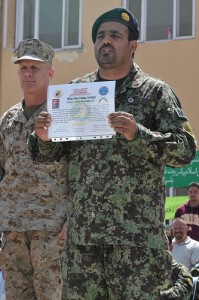Karzai Claims Final Handover of Parwan Prison Coming, Will Release “Innocents”
In a move that is guaranteed to provoke another tantrum from Lindsey Graham, Afghan President Hamid Karzai announced to the Afghan parliament today that final handover of the Detention Facility in Parwan to full Afghan control will take place on Saturday and that he plans to release prisoners that he says are innocent. Both AFP and Radio Free Europe have reported Karzai’s claims. From AFP:
“Our efforts for the transfer of the US-run prison, years-long efforts, have eventually paid off and next week the transfer will at last take place,” Karzai told the opening of a new parliamentary session in Kabul.
“This transfer of prison will take place on Saturday,” he added.
“We understand that there are some innocent people in these jails, I will order their release, no matter if there is criticism.”
Radio Free Europe also carried Karzai’s call for abuse to end in Afghan prisons:
Karzai on March 6 also called on his security forces to end incidents of torture and abuse of their countrymen.
“Today, I want to promise the people of Afghanistan that they are safe inside their houses,” Karzai said. “The law should take its course only in relations to the criminals. I call on their parliament to raise their voice and react strongly to cases of abuse, if they hear about it. As long as we do not end abuse and torture in our own institutions, we cannot stop others.”
An investigation by the government last month unveiled widespread abuse in prisons run by Afghan forces. The findings backed a recent United Nations investigation that Kabul initially rejected.
These words from Karzai on ending abuse in Afghan prisons are an encouraging development. Let’s hope the words are followed with action against those who have been involved in torture.
If it does occur, this handover will be an important next step in the US transferring authority to the Afghan government. However, handover of the prison has been a very long process in which the US has bargained in bad faith. Back in November, Karzai lashed out at US deception in this process.
Note also Karzai’s reference today to Afghans being “safe inside their houses”. That is clearly a reference to the hated US practice of night raids, which Karzai has also been looking to end. Of course, US night raids are the primary source of innocent Afghans being in US-run prisons, so it should be no coincidence that Karzai would speak of innocents being detained and night raids in the same speech.
It should also be noted that the US has a long history of secret prisons in Afghanistan and, as Marcy has noted, Obama still claims the right of indefinite detention without charges in Afghanistan, so don’t look for Saturday’s handover, if it occurs, to include those prisoners that Obama and Holder believe to be their most important, even if they can’t come up with a way to charge these prisoners with any actual crimes.
Karzai’s move to release prisoners he says are innocent could well provoke a showdown. As I reported last April, the prison agreement (and the night raid agreement, for that matter, too) although described as giving the Afghans full authority, in reality was a sham that left the US with full veto power over the release of prisoners. Will the US try to prevent Karzai releasing these prisoners? Or will the US simply re-arrest them and take them to a facility still under US control?




